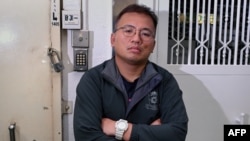Law enforcement authorities in Hong Kong have charged the chairman of the Hong Kong Journalists Association with obstructing police while covering a story earlier this month.
Ronson Chan is set to appear in court on Thursday.
The hearing comes after two plainclothes police officers stopped Chan and a videographer September 7 for “suspicious” behavior as they covered a story in the city’s Mongkok district for independent news outlet Channel C.
Chan said he was arrested for not following police instructions. The journalist told VOA he was detained and spent 11 hours in a police station. He was able to post bail of about $63. His colleague was not arrested.
Now, the 41-year-old veteran journalist is awaiting a decision on a request to have his case delayed for about six months. Ronson is due to join a Reuters Institute journalist fellowship beginning September 29 in Oxford, England.
Neither Chan's phone nor passport was seized during his arrest.
Chan said it was not clear whether he would have to enter a plea in court or whether the presiding judge would allow him to remain free while the case is pending.
“I suppose I don’t have to plead guilty or not guilty at that moment; it’s just a mention, but the magistrate judge has to decide whether they give me bail or not.
“I don’t think I have to go to jail now. I may get the bail, but I don’t have the confidence that they will give me half a year,” Chan added.
Obstructing a police officer in Hong Kong carries a sentence of up to two years in prison.
“If I don’t get a half-a-year bail, my plan to go to Oxford will have some changes," he acknowledged.
Prior run-ins
This is not the first time that authorities have sought Chan.
Chan is the former editor of the now-defunct Stand News. He closed the online news site in December after authorities raided the newsroom and arrested seven staff members as part of a sedition investigation. Chan was questioned but not charged.
The journalist has been chairman of the Hong Kong Journalists Association since July 2021. In recent years, the association has faced pressure from pro-Beijing politicians and media, alleging the press group has links to activist organizations.
Hong Kong’s media environment has faced challenging times since Beijing imposed a national security law two years ago following anti-government protests in 2019.
The law strictly prohibits acts deemed as secession, subversion and foreign collusion. Since the legislation came into force, media outlets have been shut down, and local journalists have been arrested, charged and jailed. Some international reporters have had their visa renewal requests denied.
Although sedition charges have been used to target Hong Kong's media, it is not among the offenses listed under the security law. Recent court judgments, however, have enabled authorities to use its powers under a colonial-era sedition law to target suspects.
Media watchdog Reporters Without Borders’ latest rankings for its World Press Freedom Index in 2022 saw Hong Kong descend from 80th place to 148th, with 1 being the freest, and 177 being not free.
Western critics have said Hong Kong’s media freedoms have deteriorated since the security law came into effect and seditious charges have been used to target dissidents.
On Tuesday, local media reported a Hong Kong man was arrested outside the British consulate for alleged “seditious intention” after he played “Glory to Hong Kong” on a harmonica. Demonstrators often sang the song during anti-government protests.





